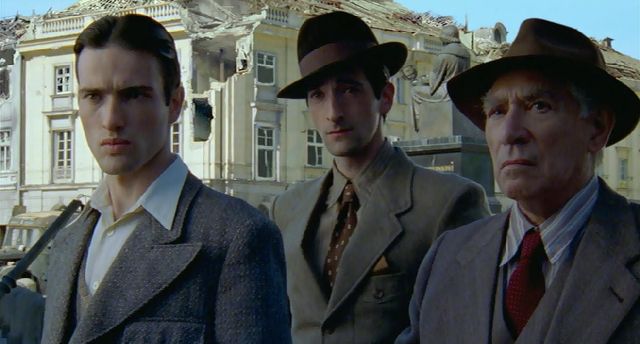The Pianist (2002) 
“Music was his passion. Survival was his masterpiece.”

Director: Roman Polanski
Cast: Adrien Brody, Thomas Kretschmann, Frank Finlay
Synopsis: A Polish Jewish musician struggles to survive the destruction of the Warsaw ghetto of World War II.
There’s something strangely detached about The Pianist, Roman Polanski’s recounting of the experiences of Polish classical pianist and Jew, Wladyslaw Szpilman, played here with a passive dignity by Adrien Brody. This is possibly because it is based on Szpilman’s own account of his experiences during the Nazi occupation of his homeland, which is also told in a rather clinical manner. It’s admirable of Polanski to remain faithful to the tone of Szpilman’s words — and relatively faithful to his testament of his and other Jews treatment — but by doing so he fails to engage audience sympathies. Given Szpilman’s perspective, it’s understandable why every Nazi soldier, with the exception of one, is painted with extremely broad stokes — they’re essentially all sadistic bullies taking abusive advantage of their position of power — but one would expect a greater degree of insight into Szpilman himself. Instead, we’re essentially given a standard treatment of the Holocaust followed by an hour or so of hide and seek.
At the time of the Nazi invasion of Poland, Szpilman is a respected musician, performing classical pieces for Polish radio. He lives with his family — parents, two sisters and a volatile brother — in a comfortable, spacious apartment, and enjoys a relatively cultured lifestyle. The family’s apprehension at the Nazi invasion is tempered by the news of Britain and France’s declaration of war, and celebrated with a lavish meal. In The Pianist, food serves as a kind of indicator of the severity of the Szpilman’s situation; by the time they are corralled into a square of the Warsaw Ghetto, awaiting transportation to Treblinka, they are reduced to sharing a tiny block of caramel.
The family’s relief at the declaration of war is short-lived, and it’s not long before the Nazis march into Warsaw. Jews are forced to live in a tiny section of the city (in which the Szpilman’s apartment is already located). Polish Radio goes off-air, but Szpilman finds work as a pianist in a cafe. Life grows increasingly hard, and dead bodies in the street become an everyday sight. Eventually, the family is re-housed in a tiny apartment, and from there it’s just a matter of time before they are sent to a concentration camp. There’s an awful air of inevitability about their fate, a horrible sense of waiting for the worst to happen, but once again Polanski fails to transmit this resigned fatalism to his characters, opting instead for a noble dignity that shames their tormentors.
Szpilman is pulled from the line of Jews being herded onto the train to Treblinka by an acquaintance who is a member of the Jewish Police. He hides beneath the stage at the cafe upon which he used to play the piano. He becomes a labourer for the Nazis, and becomes involved in smuggling weapons to the Jewish Ghetto to equip the Warsaw uprising. In 1943, when most of the inhabitants of the Ghetto are deported to concentration camps, he goes into hiding, aided by friends from the pre-war years.
Polanski was himself one of the Jews of the Warsaw Ghetto, so while we must accept the authenticity of his depiction of life back then, there is no real sense of the terror which must have stalked the Ghetto’s luckless residents. One of the strengths of Steven Spielberg’s Schindler’s List — to which The Pianist is inevitably compared — was the sheer unpredictability of just when an unutterable act of violence might occur. Death could come at any second, and Spielberg captured that constant state of heightened terror superbly. With Polanski’s movie we feel as if he includes the occasional incident simply because he feels obliged to do so because he’s making a movie about persecuted Jews, and so the acts depicted fail to provoke the sense of outrage that they should.
Szpilman’s survival ultimately depended upon the kindness of German army officer Wilm Hosenfeld (Thomas Kretschmann). The film gives the misleading impression that Hosenfeld provided Szpilman with food on only one occasion, when in reality he did so on numerous occasions, and also provided Szpilsman with a better hiding place than he had originally chosen. Szpilman was also not the only Nazi fugitive aided by Hosenfeld and several other disillusioned army officers, and you can’t help feeling that, if Polanski or any other filmmaker wished to use the subjugation of European peoples by the Nazi war machine as a backdrop for the daunting indomitability of the human spirit, then the ultimately tragic tale of Hosenfeld and his accomplices is where the real story lies…
httpv://www.youtube.com/watch?v=u_jE7-6Uv7E
